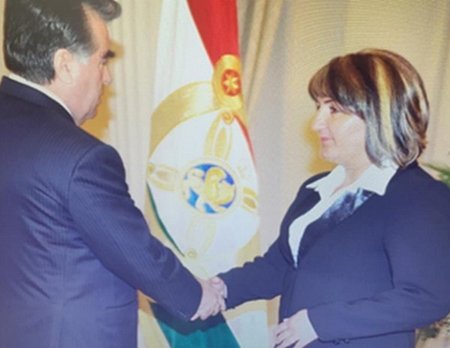



Altynay Abdykerimova (Kyrgyzstan)
Shosaboiyeva Mehrangez (Tajikistan)
Gulnara Bakhtybayeva (Kazakhstan)
Anara Sultangaziyeva (Kyrgyzstan)
Uzakova Shiringul (Uzbekistan)
Kholikzoda Mavdzhuda (Tajikistan)
Nalibayeva Gulzhan (Kazakhstan)
Zholdayakova Saule (Kazakhstan)
Zhenishkul Imanakunova (Kyrgyzstan)
Kundus Kyrbasheva (Kyrgyzstan)
Nurzat Abdyrasulova (Kyrgyzstan)
Eleonora Kazakova (Kyrgyzstan)
Elvira Borombayeva (Kyrgyzstan)
Yulia Kovalevskaya (Uzbekistan)
Umurzokova Kanoathon (Uzbekistan)

The energy sector is one of the most demanding and complex sectors and mainly run by men. This is due to the fact that the production of electricity and its delivery to the final consumer is not an easy task and requires specialized skills from technicians. However, today women and young girls are working in this sector alongside with men, making valuable contribution to the development of the sector.
Gulnora Khushkadamova is a graduate of the Ivanovo Power Engineering Institute (graduated in 1990) and, according to her, she cannot imagine her life without working in this sector. She has been working in this sector for more than 30 years and is satisfied with her work.
“I never really thought of my choice. I have been interested in electrical engineering since my school days, so when the time came to choose a university, I chose Ivanovo Power Engineering Institute.
I started my professional life in Badakhshan. I became acquainted with all aspects of this complex and labor-intensive sector when I was young. Due to my curious nature and other qualities in character, I was always entrusted with the most responsible departments and services of the company. I worked diligently to gain the trust of the company’s management,” says Gulnora Khushkadamova.
“So, there were no difficulties. Of course, there was some anxiety. I got a job right after graduation, so working in the power sector was a big responsibility, and in the first year I learned the power supply systems and tried to master everything. I read a lot of books, I was interested in everything, I took the initiative to ask others and learning from them. I see only positive aspects in my work. Maybe that’s why I can come to work every day with a smile on my face over and over again. I love my job. Not a day goes by that I don’t regret choosing this job” - says Gulnora
Gulnora Khushkadamova has for many years held the position of Director of the Power Grid Department and has played an important role in developing the company's production sector. As an example of her successful work in this responsible position she considers the improvement of the electricity supply in the Murghob highlands.
“When, with the support of the Government of the country, the German Development Bank KFW allocated the necessary funds for the construction of the Tajikistan Hydropower Plant in Murghob, our Department undertook the repair and reconstruction of the final power grid,” says Gulnora. "The good organization of work by the company’s management and the comprehensive supply of construction materials enabled the employees of the Department to lay more than 33 km of 10 kV power lines over a distance of about 160 km. from the power distribution unit using special modern self-supporting insulated wire, to install 30 units of 10/0.4 kV substations and 4 distribution stations. Another thing I will remember for the rest of my life is that on August 7, 2011, I was awarded a medal to commemorate the 20th anniversary of independence of Tajikistan. The medal was awarded by the Leader of the Nation himself, President Emomali Rahman,” recalled Gulnora.
-Do you think it is more difficult for women than for men to work in the energy sector, and why?
“Definitely, more difficult. Not every woman is capable of working in such an industry. She is either a power engineer at heart and by profession or not”.
- Do you have a motto in life?
“Yes, I do. There is: Shine always, shine everywhere. I like to give light to people.”
Acknowledged success
“Women's participation in energy management in general and in practical energy issues in particular plays an important role in achieving sustainable energy development. Gender stereotypes and prevailing socio-economic conditions that affect women's engagement in the energy sector (as consumers and as economic actors in the energy value chain) stand in the way of sustainable energy sector development:
“The energy sector should be accessible to all” - the global commitment is enshrined in Sustainable Development Goal No. 7: “Ensure universal access to affordable, reliable, sustainable and modern energy for all”.
SDG 7 is one of 17 Sustainable Development Goals for 2030 adopted in 2015 by the UN General Assembly. The Sustainable Development Agenda is unique in that the goals are integrated and indivisible, balancing different aspects of sustainable development and promising to leave no one behind.
Such is the role of SDG 5, one of the key provisions of the global sustainable development agenda, according to which “gender equality and the empowerment of women and girls will contribute to progress towards all the goals and targets”.